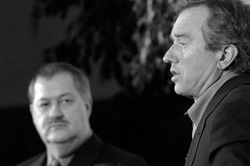Molly Moore | April 3, 2010 | No Comments

Photo by Jamie Goodman
A polite but pointed debate showed a wide gulf between environmental and coal industry positions on Appalachia’s environmental woes.
The debate was sponsored by the University of Charleston in Charleston, W.Va., Jan. 21, 2010.
Robert F. Kennedy Jr., president of the Waterkeeper Alliance, challenged coal baron Don Blankenship to be honest about the coal industry’s environmental record, especially mountaintop removal mining.
“This is the worst environmental crime that has ever happened in our history,” Kennedy said, advocating an end to mountaintop removal and a gradual shift to renewable energy sources. “We all have a moral obligation to stop this from happening.”
Blankenship, chairman of Massey Energy Company, said the issue was one of industry competitiveness in the face of “environmental extremism.”
Although the debate developed little common ground, its civil tone contrasted with the rancor of hearings and other public events in recent years.
“It’s sadly rare in our society to have a serious conversation between people with opposing opinions on a sensitive issue,” said debate moderator Edwin Welch, president of the University of Charleston.
Kennedy and Blankenship sharply disputed topics such as:
Kennedy:“You look at the way people are living in this state. The Hendryx study shows that the closer you live to a coal mine, the sicker you are.”
Blankenship: “This industry is what made this country great. If we forget that we’re going to have to learn to speak Chinese.”
Kennedy: “In a true free market system, the price of a product would reflect all of its costs. A producer like Mr. Blankenship would have to pay all of the costs of his product before he gets it to market, instead of forcing you and I and my children to pay through bad health by externalizing those costs.”
Blankenship: “Unfortunately the laws are so difficult and the lawsuits so common and the cost of doing business is so high…To force the coal business out of West Virginia or surface mining would be a huge mistake for household budgets, for industry and for homeland security.”
Kennedy: “Just this last year, Massey had 12,900 (water quality) violations—A greater concentration than even before the $20 million fine (of 2008).“
Blankenship: “There is no country that mines coal more safely or more environmentally consciously than this country, and no company that does better at that than Massey.”
Kennedy: “The mining industry makes a few people rich by making everyone else poor, whereas the wind industry distributes wealth and the benefits of that industry more evenly.”
Blankenship: “Solar energy, it works well in the daytime, but it gets cold at night. Solar…and windmill parts will be made overseas…”
Kennedy also described the biodiversity being lost through Mountaintop Removal Mining:
Kennedy: “They are the most biologically abundant temperate forests on the planet. A typical forest, all over the world, has three dominant species of trees. Appalachia has 80.”
In his summary statement, Kennedy said:
Kennedy:“Don says we have to choose between environmental protection on the one hand and economic prosperity on the other. I say that’s a false choice…Good environmental policy is identical to good economic policy. We want to measure our economy… based upon on how it produces jobs, and the dignity of our jobs, over the generations, over the long term, and how it preserves the value of the assets of our community. If on the other hand we want to do what Don himself and his company have been urging us to do, which is to treat the planet as if it were a business in liquidation, convert all of our natural resources to cash as quickly as possible, have a few years of pollution based prosperity, we can generate an instantaneous cash flow and the illusion of a prosperous economy, but our children are going to pay for our joy ride, and they are going to pay for it with denuded landscapes and poor health and huge cleanup costs that are going to amplify over time.
Environmental injury, particularly of the kind that is happening today in West Virginia, is deficit spending. It’s a way of loading the costs of our generation’s prosperity onto the backs of our children….An investment in our environment is (not) a diminishment of our nation’s wealth. It’s an investment in infrastructure, like telecommunications or highways.
What I would say to the coal industry is go underground, employ lots of people, and do this safely as West Virginia makes a transition to a new energy future.”
Like this content? Subscribe to The Voice email digests